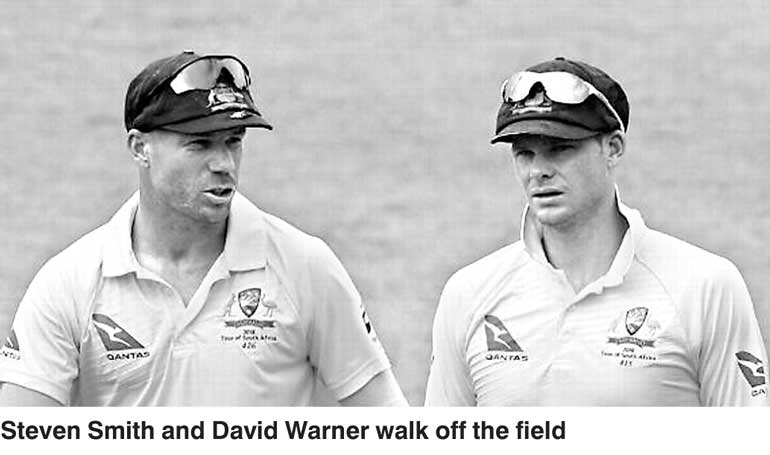Saturday Feb 21, 2026
Saturday Feb 21, 2026
Saturday, 31 March 2018 00:00 - - {{hitsCtrl.values.hits}}

ESPNCricinfo: From a “real, deep, place” in his heart, Faf du Plessis has sent his former opposite number Steven Smith a sympathetic text message following the ball-tampering saga that saw Smith reduced to tears on his arrival in Sydney.
“I feel for the guy,” du Plessis said, on the eve of the fourth Test in Johannesburg. “You don’t want to see guys going through that and it’s going to be incredibly hard for him over the next days. I just sent him a message of support saying that he’ll get through this, he must just be strong. He appreciated the message. There is a lot of respect between the two of us. He’s a good leader for Australia.”
After all the bad blood that has tainted this series, it feels momentous that someone has been able to find and utter the word “respect”. Du Plessis went even further. He offered Smith “compassion”, admitted to being in the same position (literally, as du Plessis has been found guilty of ball tampering twice) and suggested it is already time for Smith start picking up the pieces and for the public to allow him to rebuild his reputation.
“I do feel sorry for Steve and I do have a compassion for what he is going through. I think he is one of the good guys and he’s just been caught in a bad place. He’s obviously taken responsibility for that,” du Plessis said. “We’re not sitting in a glass house where we think we are better than them in that aspect. It’s a mistake that was made and I feel that, it’s easier said than done, but they can move on now. You don’t want to see any cricketer or person go through that amount of pain. I feel for what he’s going through as a captain.”
Like Smith, du Plessis knows the responsibility that comes with leading a team and believes one of Smith’s regrets will be that the chance to create a legacy under his own name has been squandered. “I know as a leader he would have tried to have his identity put into the Australian team and perhaps now that that chance has been taken away from him, that’s not nice,” du Plessis said. “To be a captain of your country is a huge honour and you can see the disappointment. I feel really sorry for him.”
Asked whether the one-year ban, which includes a ban from the IPL, 100 hours of voluntary service, and an order to play grade cricket, is too harsh, du Plessis replied in the affirmative, though he accepted that the seriousness with which Australians regard their cricket provides some context about the severity of the sanction. “I think, yes, I think so, but I understand the context of it now,” du Plessis said. “Perhaps I didn’t understand how important it is to them, but you can really see how much it means to the Australian public. You can understand why they think they need to be so harsh.”
Du Plessis and team-mate Vernon Philander would not have dreamt of a similar punishment being lumped on them when they were found guilty of the same offence. In fact, the opposite happened. Cricket South Africa came out in support of its players with team manager Mohammed Moosajee saying it was “harsh” to call du Plessis rubbing the ball on his zipper in the UAE ball-tampering. The management also tried to suppress footage of Philander’s incident and CSA mounted a staunch defence of du Plessis during the Mintgate scandal in Australia in November 2016. Now, du Plessis suspects punishments will be harsher, especially after the ICC has also opted to review its code.
“From where I’m sitting, I think it (Smith’s sanction) is harsh if you go back into the history where certain players have been in similar situations. The positive from that is that this is making even the ICC realise that they (Cricket Australia) are going harsher than them so maybe they need to sharpen up. If you do intend to do something illegal with the ball, you don’t just walk away from it with three demerit points and a 75% fine,” du Plessis said, referring to the penalty handed down to Cameron Bancroft.
Though that may mean du Plessis would also not get away as much as he has, he welcomed the ICC’s review, reminding that it was something he has called for during Mintgate, when CSA wanted a clearer definition of what constitutes a foreign substance being applied to the ball. “I think it’s overdue. I remember in Australia two years ago with Mintgate and there was no clarity as players. We don’t know what is allowed and what is not allowed. Once you have those grey areas I think a lot of things will happen that perhaps shouldn’t happen. Perhaps something like this is the good that can come from that you can be a lot clearer and players can have a good understanding,” du Plessis said. “Also the penalties and you get the same penalties for different things. It’s good that they are thinking that way.”
And if the ICC is reading, du Plessis does not think sledging should be banned from the game because he thinks it is minimally made use of, and equally minimally effective. “I don’t think that sledging has had that much influence on the way people play. I think it’s something in the past that people maybe thought had a huge impact,” he said. “Maybe there are one or two guys that still feel a bit more pressure when they feel there is a bit of verbal on the field.
For me, it motivates me when I hear people say things on the field. Generally in cricket over the past two years I haven’t felt like that boundary has been pushed a lot with playing different teams.”